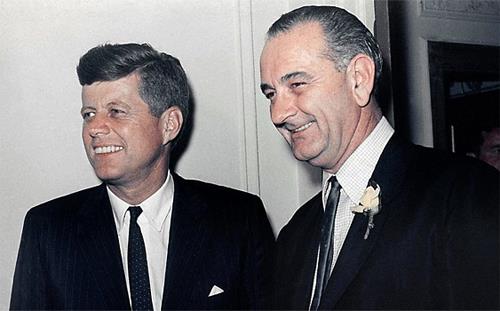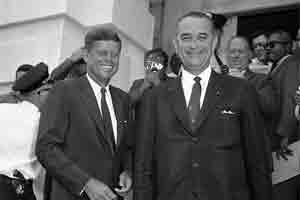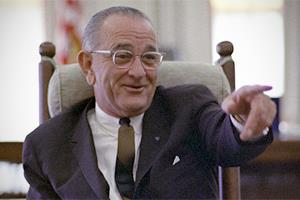
New U.S. presidents almost always are immediate heirs. They usually inherit the big problems from the previous leader, and -- if lucky -- some of the glow, if there is any. There was a lot of the former and only bits of the latter when Lyndon Johnson took over the presidency after the 1963 assassination of John Kennedy.
But many of those who lived through the Johnson presidential years, as well as those who haven't but have cursorily studied that time, aren't to blame if they consider Johnson the unprepared and unpolished understudy. By many he's considered a man who invoked none of the Camelot magic and whose miring in the Vietnam War divided a country and caused him to forgo a try for a second elected term.
 JFK & LBJ: A Time for Greatness
JFK & LBJ: A Time for Greatness (PBS Aug. 4 at 9 p.m. ET, check local listings) aims to polish the image. And it does a good job, for most of the hour. But first, two rather obstructive nits to pick: Johnson's problematic assumption of control over the combats in Southeast Asia isn't mentioned until the end of the hour -- and then in almost an afterthought manner. Johnson was paddling against a strong current with the war, and the historical effects of that dynamic force seem oddly missing. Another obstacle to the program's effectiveness is its use of actors to play the roles of Johnson and others. These dramatic interludes are interspersed with actual footage of the time. To some, they just might be confusing; to many, it's guessed, they are annoying and unneeded.
But please don't let those production issues stop you from watching this film. Through the use of phone conversations recorded by Johnson (including one powerful call to Dr. Martin Luther King Jr. only hours after becoming president) and interviews with historians, civil rights leaders, news professionals, and former members of the Johnson administration, the hour demonstrates how strongly the president cared about civil rights and how he worked hard and with the many skills he acquired as a senator to effectively fight many fellow southern legislators in the passing of the Civil Rights Act of 1964 and the Voting Rights Act of 1965.
It's fascinating, enlightening and retroactively dramatic to witness the mastery of the team he led to accomplish this.
Documentaries that cover political history almost always attract the counterpoint. There probably will be some who dispute Johnson's historic record as presented here and react to the implication that his was a presidency of more substance than the one that preceded it.

Despite what he accomplished for racial equality in the United States, Vietnam sticks with his presidency as a huge asterisk. "If I've lost Cronkite, I've lost Middle America," Johnson reportedly said after watching Walter Cronkite's negative assessment of the war after visiting Vietnam. The commander-in-chief for the Vietnam War did make some large misjudgments. This program, however, sheds deserved focus on another important and more successful part of the Lyndon Johnson legacy. Even though static between races remains a critical U.S. issue, imagine what the country would be like if Johnson hadn't made racial equality a major focus during his time in the White House.